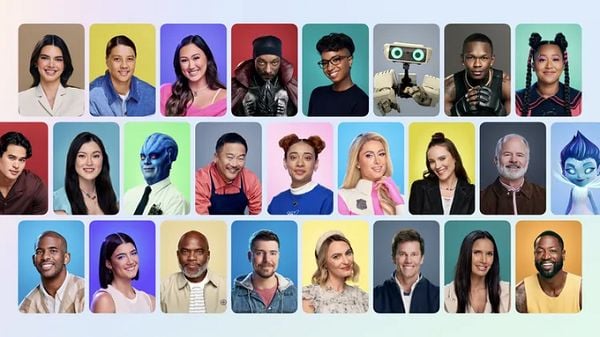Meta has announced a range of new AI-based features at its 2023 Connect conference, headlined by its AI chat assistant tool, which will essentially integrate a ChatGPT-like bot within all of Meta’s apps.
And what’s more, it’ll be available in different personalities, based on celebrity voices, in order to enhance familiarity and engagement.
There’s a heap to dig into and consider, here’s a summary of all the key updates announced at Connect day one.
AI Chatbots
First off, as noted, the big announcement of the day, which Meta’s hoping will be its leap into generative AI, is its new AI assistant.
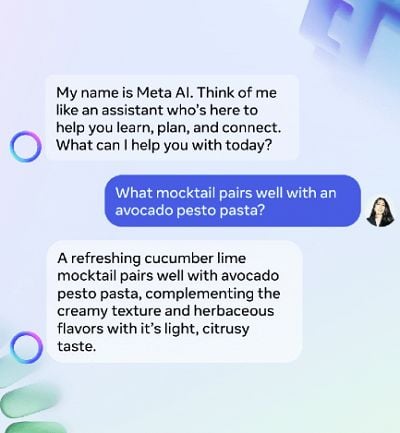
As explained by Meta:
“Meta AI is a new assistant you can interact with like a person, available on WhatsApp, Messenger, Instagram, and coming soon to Ray-Ban Meta smart glasses and Quest 3. It’s powered by a custom model that leverages technology from Llama 2 and our latest large language model (LLM) research. In text-based chats, Meta AI has access to real-time information through our search partnership with Bing and offers a tool for image generation.”
Partnership with Bing? That’s unusual.
In a separate post, Microsoft outlined how Bing data will be shared with Meta AI:
“We’re thrilled to announce that we’ve begun to work with Meta to integrate Bing into Meta AI’s chat experiences enabling more timely and up-to-date answers with access to real-time search information. Bing’s integration extends to Meta AI and a few of Meta’s other AIs available to message with in WhatsApp, Messenger, and Instagram.”
So real-time information to fuel Meta’s AI responses. Wonder what Microsoft’s getting in return?
As you can see in the above example, the new AI chatbot will function much like you would expect, providing the capacity to ask questions, and get immediate answers to queries in-stream.
Which is pretty much in line with the latest wave of AI chatbots, though it is also worth noting that Meta tried this exact same thing back in 2015.
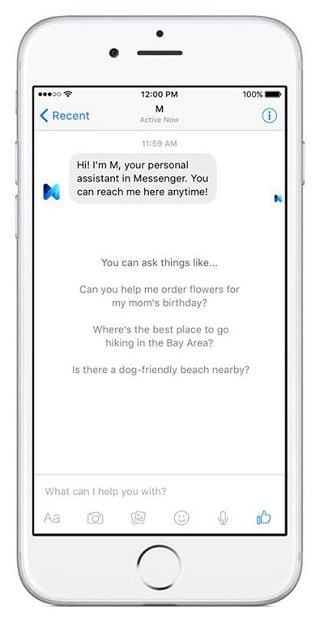
This was Meta’s first chat assistant tool, called “M”, which was designed to provide direct answers and prompts in-stream, and usher in the new age of chatbots on Messenger.
Except, it had problems, with the bot sometimes producing questionable replies, meaning it had to be heavily monitored by actual humans in order to keep it in line.
Meta eventually ended the “M” experiment in 2018, due to high maintenance and low usage, with the latter being more of a concern for Meta at this stage, as it tries the same again.
Of course, the new “M”, which is not called “M”, but is pretty much the same thing, will be powered by Meta’s more advanced AI, which should make it more valuable. But will users be more receptive to such the second time around?
Meta’s not taking any chances, which is why it’s also giving its new chatbot celebrity voices to enhance the experience.
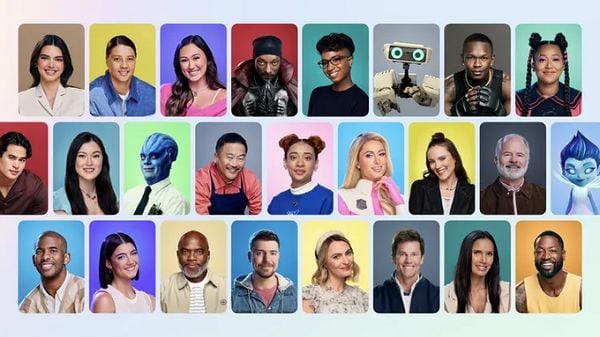
Meta’s new chatbot experience will be able to interact with you in the communications style of any of these celebrities, which Meta’s hoping will make it a more engaging, entertaining experience.
All in all, there are 28 characters that you can interact with via Meta’s AI chatbot, with more to come, including bots in the style of Bear Grylls, Chloe Kim, and Josh Richards, among others.
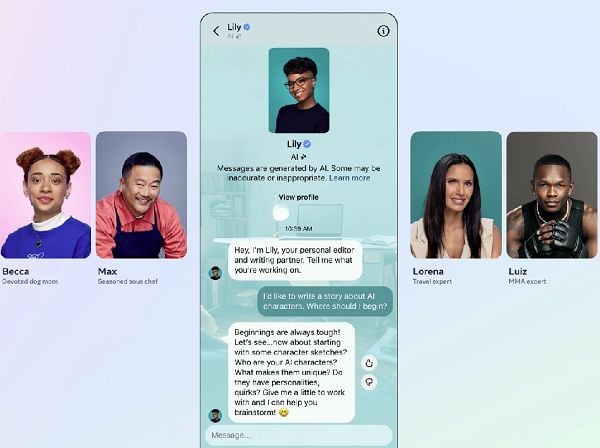
Will that make it a bigger hit this time around?
Personally, I have my doubts, as it seems like more of a gimmick, which will generate initial interest, for sure, but that’ll wear off quickly. But maybe, with different characters, in different styles, that can provide you with valuable information, and more personalities on the way, that could get more people engaging with AI bots in each app.
We’ll find out, with Meta’s new AI chatbots rolling out in beta testing with selected U.S. users from today.
AI Tools on IG
AI image editing is also coming to Instagram, with a new feature that’ll essentially add new AI-driven filters for your posts.
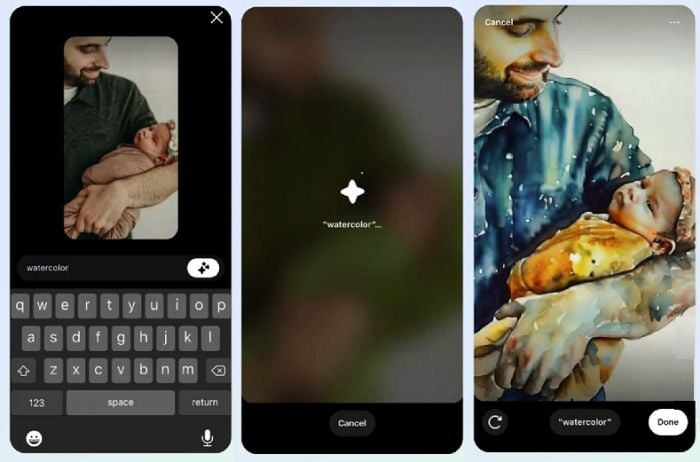
So rather than just adding a regular image filter, the new AI editing tools will enable you to recreate your uploads in a completely different style.
“Restyle lets you reimagine your images by applying the visual styles you describe. Think of typing a descriptor like “watercolor” or a more detailed prompt like “collage from magazines and newspapers, torn edges” to describe the new look and feel of the image you want to create.”
That could spark a range of new visual trends in the app, with simple prompts that could drive new, artistic style movements, based on prompts. Brands could also use this to create customized, thematic visuals, which they could then apply to all of their uploads moving forward, by using the same prompt for each.
Though this second AI element may be of even more value for brand use.
“Backdrop changes the scene or background of your image. Prompts like “put me in front of a sublime aurora borealis” or “surrounded by puppies” will cue the tool to create an image of the primary subject in the foreground with the background you described.”
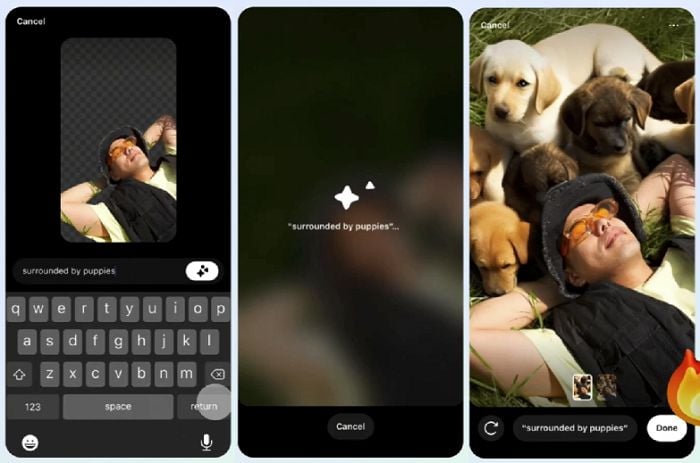
That could be a valuable option for product photography, or customized model shots and examples, with brands able to create a consistent scene that they can use for each of their IG uploads.
It could be a valuable addition, and it will likely see a lot of experimentation and interest.
Generative AI Stickers
Meta’s also announced new AI stickers, which will enable users to create custom digital stickers for chats and stories.

As you can see in this example, now, on WhatsApp, Messenger, Instagram, and within Facebook Stories, you’ll be able to use simple text prompts to create cartoonish stickers to add to your interactions.
As explained by Meta:
“Using technology from Llama 2 and our foundational model for image generation called Emu, our AI tool turns your text prompts into multiple unique, high-quality stickers in seconds.”
I mean, they don’t seem like a huge innovation, but Meta also notes that billions of stickers are sent across its apps each month, so they could be a valuable option for many people.
Meta says that AI stickers will roll out to select English language users over the next month.
Create Your Own AI Bot
On another front, Meta’s also launching a new AI studio, which will enable people to create their own AI engagement systems, based on their own communication style and voice.
“Developers will be able to build third-party AIs for our messaging services with our APIs in the coming weeks, starting on Messenger then expanding to WhatsApp. Businesses will also be able to create AIs that reflect their brand’s values and improve customer service experiences.”
Depending on the data inputs required for such, this could be an easy way to integrate AI chatbots into your own business interaction process, which could be a valuable engagement option, especially if more consumers become more accustomed to communication with these new bot tools.
Ray Ban Stories V.2
Meta’s also announced a new version of its Ray Ban Stories smart glasses, with improved hardware and battery life.

Also this:
“You can now livestream from the glasses to Facebook or Instagram. And you can see the comments in your preview, or tap and hold on the side of your glasses to hear them out loud to engage with your community as you’re living in the moment.”
That could be a big addition, which could make the device a more attractive option for online creators.
The new Ray Ban Stories glasses will start at $US299, and pre-orders are open now on meta.com and ray-ban.com. The glasses will be available for purchase online and in retail stores starting October 17th.
Quest 3
Finally, Meta also unveiled its new Quest 3 VR headset.
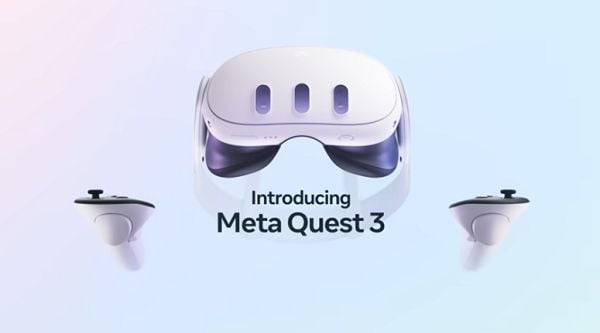
The new Quest 3, its most advanced VR unit yet, will be available to users from October 10th, with Meta hoping that it’ll be featured prominently on many Christmas wish lists.
Meta’s shared a range of insights into the Quest 3 already, with the new headset to facilitate both VR and mixed reality experiences.
“Meta Quest 3 features breakthrough mixed reality that enables a spectrum of experiences. You can play a virtual piano on your coffee table or open a portal to another dimension right in your living room — all while high-fidelity, full-color Passthrough keeps your physical surroundings in sight with over 10 times more pixels compared to Meta Quest 2.”
Meta’s hoping that this new unit will become the standard for VR experiences, which will also help to guide users towards its next-level metaverse environment.
Also, this is interesting:
The Quest 3 starts at $US499.99 for the 128GB version, and $US649.99 for the 512GB model.
In addition to this, Meta also shared some brief notes on its coming Meta Quest for Business platform, which will enable users to incorporate various enterprise applications, including Microsoft 365 tools, into a virtual office space. Meta hasn’t shared much info on this, but it’ll add another angle to its broader VR push. Meta’s been developing professional VR usage options since 2020.
A heap of updates to consider, with a range of implications. Meta’s making a big push on generative AI, which has been coming for some time, but whether users warm to these new AI elements will be the big test for its expanding efforts on this front.

